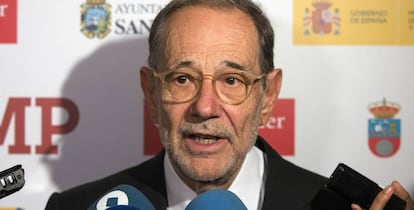Manifesto calls on Spain’s politicians to avoid third election
Almost 50 artists, intellectuals and former politicians tell party leaders to make the sacrifices to form a government

A group of Spain's leading artists and intellectuals, along with prominent ex-political leaders, have signed an open letter calling on the country's parties to do everything in their power to avoid a third national election in Spain within a year.
The 47 signatories, whose political affinities range from the Socialist Party (PSOE) to the conservative Popular Party (PP) as well the upstart Ciudadanos, include six ex-ministers under Socialist governments and one ex-minister under the PP.
Writer Fernando Savater and former NATO secretary general Javier Solana are also on the list of individuals who are saying that “the priority” for Spain right now is getting a new government up and running.
They will have to decide whether, through their abstention, they make Mariano Rajoy the prime minister
Podemos leader Pablo Iglesias
“The time has come to seek agreements and solutions, instead of remaining obsessed with finding culprits to assign unassignable blame to,” reads the letter, which is also signed by historian Santos Juliá and film director Manuel Gutiérrez Aragón.
The document further asks parties to “avoid the absurd situation of forcing voters to entrust the solution to the problem to a new election.”
“All leaders and parties should know that they have already competed against each other at the polls on two occasions, and that they are under the obligation to make all efforts and sacrifices necessary, including the most personal ones, to end this untenable, government-less situation,” ends the letter.
No legislative activity
Spain has been under a caretaker government since the original election of December 20, which yielded a hung parliament. Attempts at cross-party negotiations were mostly fruitless, and the only candidate who stepped up for the prime minister’s job, the Socialist Pedro Sánchez, was voted down at an investiture vote in Congress. The acting prime minister, Mariano Rajoy of the PP, declined to bid for the post as he knew that he lacked congressional support.
“Anyone” in exchange for a referendum
Oriol Junqueras, the Catalan deputy premier and member of the separatist Catalan Republican Left (ERC), said on Thursday that he is willing to “support any candidate” in his investiture bid as long as, in exchange, Catalonia gets a Scottish-style referendum on independence.
This pushed the country into a fresh election which was held on June 26. The PP conservatives won the most seats again, but fell short of a parliamentary majority once more.
With the country’s legislative activity at a standstill for over half a year, and Brussels pressuring Madrid to meet its deficit reduction commitments, King Felipe VI has given Rajoy one week to produce an agreement that will enable him to form a government.
But so far, leaders seem to have done little to bridge the political divides. The Socialist Party and the anti-austerity Podemos, who once seemed on the verge of forming an alternative leftist coalition that would have made Sánchez the prime minister, are now increasingly distanced from one another.
Sign up for our newsletter
EL PAÍS English Edition has launched a weekly newsletter. Sign up today to receive a selection of our best stories in your inbox every Saturday morning. For full details about how to subscribe, click here.
Neither party has made the slightest effort to reach out to the other following the June 26 election. Instead, both party leaders are blaming one another for the fact that the PP will very likely hold on to power in La Moncloa if he manages support from Ciudadanos and a few regional parties, and gets the rest to at least abstain from voting against him at the investiture vote that is due to be held in the coming weeks.
Podemos leader Pablo Iglesias said on Tuesday that he thinks the Socialists will help Rajoy into office by abstaining at the run-off of that vote. “The decision is up to them. They will have to decide whether, through their abstention, they make Mariano Rajoy the prime minister,” he said earlier this week.
In reply, Socialist Senate spokesman Óscar López returned the ball to Iglesias’ court, stating that “all that’s left for Pablo Iglesias to do, in view of his behavior these last six months, is to finish the job: to abstain and help Rajoy into government.”
The left is coming
Meanwhile, the PP is seeking to convince the reform party Ciudadanos, which had previously reached a deal with the PSOE following the first elections, to support Rajoy in order to avoid a leftist government that, it claims, would be destabilizing for Spain.
But Ciudadanos, which began life as a Catalan non-nationalist party and defends the unity of Spain, is wary of the PP’s apparent deals with the Basque Nationalist Party (PNV) and the Catalan Convergència.
English version by Susana Urra.
Tu suscripción se está usando en otro dispositivo
¿Quieres añadir otro usuario a tu suscripción?
Si continúas leyendo en este dispositivo, no se podrá leer en el otro.
FlechaTu suscripción se está usando en otro dispositivo y solo puedes acceder a EL PAÍS desde un dispositivo a la vez.
Si quieres compartir tu cuenta, cambia tu suscripción a la modalidad Premium, así podrás añadir otro usuario. Cada uno accederá con su propia cuenta de email, lo que os permitirá personalizar vuestra experiencia en EL PAÍS.
¿Tienes una suscripción de empresa? Accede aquí para contratar más cuentas.
En el caso de no saber quién está usando tu cuenta, te recomendamos cambiar tu contraseña aquí.
Si decides continuar compartiendo tu cuenta, este mensaje se mostrará en tu dispositivo y en el de la otra persona que está usando tu cuenta de forma indefinida, afectando a tu experiencia de lectura. Puedes consultar aquí los términos y condiciones de la suscripción digital.








































